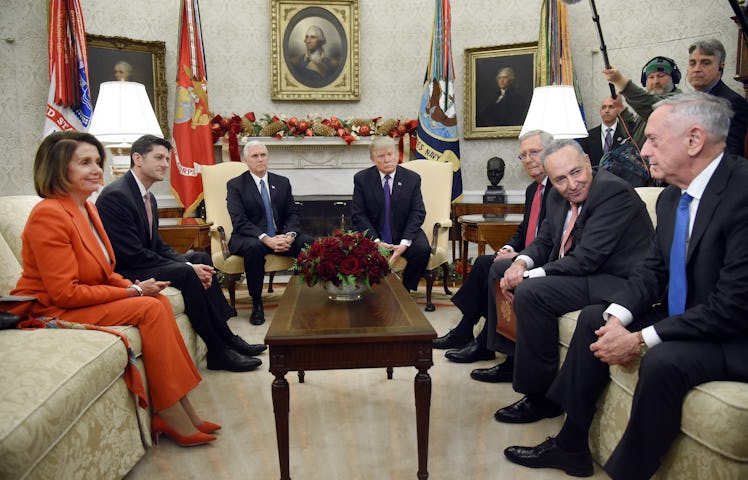
Congress Just Avoided A Government Shutdown For Two Weeks By Passing This Bill
Friday, Dec. 8, once represented a do-or-die situation for Republicans and Democrats in Congress: Either agree to a new budget to fund the federal government, or don't agree and face the consequence of no funding at all, which would result in a government shutdown. On Thursday, though, Congress found a compromise, passing a temporary funding bill that averts a potential government shutdown for a couple more weeks. Now, the question is not when will the government shutdown happen, but still if the government will shut down.
How Much Time Does Congress Have To Avoid A Shutdown Now?
After passing the temporary bill, Congress now has two more weeks to answer that question, which means the new deadline to agree on a federal budget is Friday, Dec. 22.
In the meantime, leading Democrats and Republicans have the task of continuing negotiations about how much money is allocated to every department, organization and other priorities that are funded by the federal government. One round of negotiation took place at the White House on Thursday. There, at 1600 Pennsylvania Avenue, President Donald Trump and Vice President Mike Pence met with the four most senior leaders in Congress.
From the Senate there was Majority Leader Mitch McConnell (R-KY) and Minority Leader Chuck Schumer (D-NY). Representing members of the House of Representatives was House Speaker Paul Ryan (R-WI) and House Minority Leader Nancy Pelosi (D-CA).
In comments to reporters at the White House, both sides expressed optimism about coming to an agreement. "We're all here as a very friendly, well-unified group. It's a well-knit-together group of people," President Trump said. "And we hope that we're going to make some great progress for our country. I think that will happen, and we appreciate it very much."
"We are here to make progress" Rep. Pelosi said. "We have some important issues that we share with you. You have described the opioid crisis in our country, and we want to address that; help our veterans; S-CHIP, children's health insurance; and, again, all things that have bipartisan support in the Congress."
What Are The Most Important Things Congress Needs To Agree On?
During Thursday's meeting between Republican and Democratic leaders at the White House, much of the conversation to focused on how funding will increase for the military, Politico reports. Both parties want an increase, but disagree on what that increase will mean for spending in other areas.
Another area in which both parties have to work together is the Deferred Action for Childhood Arrivals (DACA) policy. In September, President Trump rescinded the program — which protected from deportation illegal immigrants who came to the United States as children — and call for the protections to end after six-month window.
Now, as Democratic leaders come to the table to negotiate, they're seeking a compromise that includes permanent protections for DACA recipients, a fact which makes DACA key to avoiding a government shutdown. "We will not leave here without a DACA fix," Pelosi told reporters on Thursday.
The most important thing to note is that these negotiations have to happen in the first place. That's because unlike the GOP's efforts on tax and health reform — which Republicans have sought to pass by a simple majority vote, which they have — a spending bill requires 60 votes in the Senate. In other words, Republicans need more than the 52 senators in their party to agree with them on a budget.
If that agreement doesn't happen, then a shutdown will, and then attention will turn towards who the blame belongs to.
"If a shutdown happens, as the president seemed to be rooting for in a tweet earlier this year, it will fall on his shoulders," Sen. Schumer said on the Senate floor Thursday. "His party controls the Senate, the House, and the presidency."
They all have two weeks.